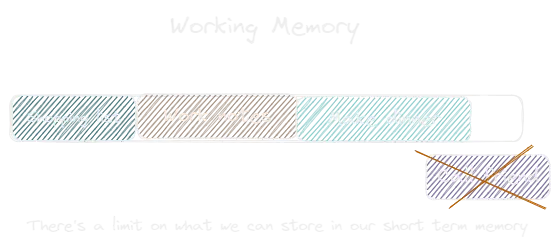Working Memory
Notes
Working Memory is all the information that we just processed and are able to hold in our mind for the short-term. The more our working memory is full, the less Focus we can have. Imagine it like a warehouse that is constantly having things brought in and out, the less space we have, the harder it is to use it efficiently. Blank Space.
That's why we find ourselves Forgetting some things while keeping others. Usually what we keep is what our mind thinks we will use again later Caching. Alternatively if it something we do repeatedly with low mental effort it converts it into a habit so that it will take less space later Habit formation.
Working memory can be greatly improved by Chunking and Mental Shortcuts. The easier the information is to digest, the less memory it requires. Meaning that working memory is not limited by the size of what we're trying to remember, but the difficulty to due so.
For example, remembering a random set of numbers is hard, but if we give meaning to it, like a phone number, it becomes much easier. Or, if we have a pre-built mapping of each number to a place, a person or an action, it is much easier for us to remember something tangible than random numbers Memory Palace.
Additionally, our working memory is less effective when we have less of it to spare. For unfinished tasks tend to linger, leaving less attention for other tasks.
We should note that our working memory is a tool for the short term. It is a processing stage for simple tasks, and more complecated ones are transferred to the long term memory. In general our mind is a processor and not a warehouse, we can't expect ourselves to remember everything all the time, and especially not hold it in our conscious mind when we work on something important. It is best to outsource our memory, or parts of it, to more stable forms of memory like digital copies.
Visual

Overview
🔼Topic:: Human Brain 🔼Topic:: Memory, Attention and cognitive load (Map) ↩️Origin:: 🔗Link::